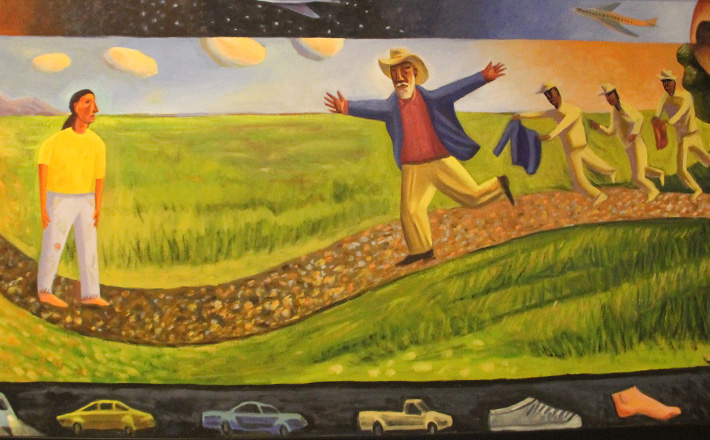Commentary on Psalm 32
What does it mean to be counted as blessed? How might we know? The psalmist here weaves a tapestry of tones together that invite reflection about the mercy of God and the importance of confession.
They are like the tonal variations in an Ad Reinhardt painting that invite viewers to consider simplicity and complexity at the same time. Reinhardt’s “Abstract Painting, Blue” looks at first glance to be only blocks of different shades of blue paint set next to each other.1
Careful contemplation of Reinhardt’s paintings invites viewers to consider the edges and tones of their own lives and how those tones reflect significant movements in the journey of faithfulness.
Daily living is both complex and simple. Many everyday tasks involve reflection and action. In some cases reflection precedes action. In others the action provokes reflection and a spiral of subsequent actions and reflections.
Either way there is some catalyst for human cognitive rumination about something or someone that provokes new understanding. Our mistakes and missteps — that could at times be called “sin” — provide as many motivations for reflection as do our deeds of faithfulness. They invite patient observation about what provoked the acts of unfaithfulness and cognitive decisions about confession, repentance, and renewal.
Grace
In many Christian contexts worship practice provides a time, space, and environment for public confession followed by the affirmation of God’s grace of forgiveness. The mercy of the Lord is from everlasting to everlasting. It seems that sometimes parishioners see confession as something of a transactional agreement. I confess and God forgives because I confessed. However, here the order is reversed. Grace comes first in the order of things and it is the experience of grace itself that prompts confession. The confession is followed by another affirmation of God’s grace and a call to corporate confession.
For the psalmist, God’s grace isn’t contingent on human confession. The grace and mercy of God is a given. It seems that the Psalmist is more concerned about the effects of confession on the human spirit, human community, and how it signals a change of heart and mind in individual and communal ways. It is a means by which individuals and communities might focus more concretely on the patterns of living that are in accord with that which God has established as good.
Confession
Confession provides a way for people to admit to God and to oneself that a wrong has been committed. People know it and cannot free their minds from the guilt that is coupled with wrongdoing. Even if they harden their conscience against the wrong, the wrong remains and the guilt hovers over it like a hawk waiting to descend. The psalmist affirms that it is what it is and that it cannot be covered over until God has provided the covering.
There are many things that make people different. However, it seems that Scripture is clear about the common human experience of sin. No matter how hard people may try, the capacity of sin to cling to us is stronger than human capacity to fully overcome it apart from God’s grace and mercy. Yet sin is a slippery fish to hold in a fast flowing stream. It is sometimes difficult to discern. The subject of sin itself in contemporary scholarly writing has been widely debated and at times those things that may be regarded as sin are later seen to be something other than sin — even not sin at all. The line in the sand sometimes becomes blurry or removed altogether.
So people may wonder what is sin and how will I know if I am committing it or have committed it? The complexity of sin cannot be understated. In personal life some would argue that it is viscerally known. In some cases people may sense something is off, but can’t quite name what it is. Sometimes people need someone to help them identify the sin so that it might be confessed. But even there, the one naming the sin might be mistaken in calling something a sin.
In corporate contexts sin is even less easy to discern. People are interlinked with hosts of other people through contracts, credit cards agreements, social networking relationships, business arrangements, employment, and so on. The list is extensive and could extend for pages. In every one of those links there is a potential for sin and a capacity for complicity in some kind of sin. Relationships are complex and can be quite chaos ridden and messy.
In my experience, relationships are not generally well ordered or cohere to some mechanical framework. They are more like complex ecosystems that involve more dimensions than can be observed immediately. Hence, sin can be connected to us by a spider’s silken strand that we cannot even feel. Yet, it is there nonetheless. How might we discern and acknowledge the sin when we don’t even know that a sin has been committed or that we have participated in it? Perhaps this is where corporate confession can be helpful.
In one of the many congregations I have served there was a practice for congregational members to lead most of the worship service. One particular layperson was fond of saying that the silent prayer of confession was usually too short. He claimed, “I have not even made it through Tuesday before they are announcing that I am forgiven.”
So when he led the worship service, the corporate prayer of confession — including the silent prayer of confession — would be longer than most people felt comfortable with experiencing. I think the discomfort in part was shared because the list of things for which any one person could confess is generally longer than an entire worship service might take.
Teaching & Rejoicing
God is a teacher who provides people with that which they need to know about how to live a life worth living. Perhaps this is one of the clearest statements that the Psalms articulate.
No one method is elevated above the others. Although ancient Semitic cultures would have had a preference for oral, visual, and kinesthetic forms of knowledge transmission, the Psalms suggest a wider array of possibilities. Learning modes are as diverse as there are people on the planet. No one teaching method will work for all people. Variety and diversity are more the norm than not. The human mind is complex and culturally, socially, environmentally, generationally, and so on conditioned. People learn in different ways because of the environments in which they were formed and in which they live.
“Rejoice in the LORD and be glad, you righteous; sing, all you who are upright in heart!” (Psalm 32:11). It is a beautiful thing to be able to sing and rejoice — to be glad in heart and mind. Those who experience gladness cannot help but rejoice over blessings received. The Psalmist invites those who are counted as right with God to rejoice, be glad, and sing. The liberation of God’s grace frees the human bird from its cage of despair so that it might be free to sing praise without restraint.
Conclusion
The Psalm’s tapestry tones invite reflection — thoughtful rumination on God’s mercy, the gift of confession, teaching methods of God, and causes for human rejoicing. Each tone suggests intimate connections and variations that are part of individual human lives, threads of human communal connections, and patterns of human systemic relationships. Variations abound and simple tones remain side by side. Together they form a tapestry for theological reflection and hope.
1Ad Reinhardt. Abstract Painting, Blue. http://www.moca.org/pc/viewArtWork.php?id=61 <Accessed September 28, 2012>


March 10, 2013